18 states and 2 UN entities came together in Bucharest to discuss the protection of cultural and natural heritage in danger
Article published on 14-10-2019 The National Commission of Romania for UNESCO organized in Bucharest an international meeting on the protection of cultural and natural heritage in danger, part of the inter-regional project "HeRe - Heritage Revivals - Heritage for Peace", organized during 2019, co-funded by the United Nations Educational, Scientific and Cultural Organization (UNESCO).
The National Commission of Romania for UNESCO organized in Bucharest an international meeting on the protection of cultural and natural heritage in danger, part of the inter-regional project "HeRe - Heritage Revivals - Heritage for Peace", organized during 2019, co-funded by the United Nations Educational, Scientific and Cultural Organization (UNESCO).
The meeting created an efficient space for discussions and networking of professionals interested in good practices and case studies regarding the conservation of cultural and natural heritage affected by dangers such as: armed conflicts, natural disasters, serious deterioration of building materials, modification of the legal status of the property, lack of conservation policies or management system, threatening effects of regional planning projects, negative impact of climatic or geological factors, serious decline of the species population due to natural factors (disease) or human factors (poaching), severe deterioration of natural beauty or the scientific value of the property, as a result of pollution of human settlements, industrial and agricultural development, logging, etc.
The project also explored synergies between various UNESCO Conventions that protect cultural heritage: the 1972 Convention Concerning the Protection of the World Cultural and Natural Heritage, the 1954 Hague Convention for the Protection of Cultural Property in the Event of Armed Conflict (and its 2 Protocols), the 1970 Convention on the Means of Prohibiting and Preventing the Illicit Import, Export and Transfer of Ownership of Cultural Property.
The participants came from 18 countries from 5 geographical regions – Armenia, Austria, Azerbaijan, Belgium, Chile, Côte d'Ivoire, Denmark, Egypt, Georgia, Germany, Italy, Kenya, Lithuania, Nigeria, Romania, Serbia, Uganda, United States of America - and 2 UN entities - the United Nations Educational, Scientific and Cultural Organization (UNESCO), through the World Heritage Centre and the Section for Movable Heritage and Museums, and the United Nations Office on Drugs and Crime (UNODC).
The institutions and organizations represented by the participants from the 18 countries were the following: Armenian National Commission for UNESCO; Austrian National Commission for UNESCO; Ministry of Foreign Affairs of the Republic of Azerbaijan; Belgian Public Broadcaster; National World Heritage Centre, Ministry of Culture, Arts and Heritage of the Republic of Chile; Ivorian Office of Parks and Reserves of Republic of Côte d'Ivoire; Nordic Center for Cultural Heritage and Armed Conflict, headquartered in Denmark; Islamic, Coptic & Jewish Antiquities Sector, Egyptian Ministry of Antiquities; Department of International Cultural and Humanitarian Relations, Ministry of Foreign Affairs of Georgia; National Commission of Germany for UNESCO; Carabinieri Command for Protection of Cultural Heritage in Italy; National Museums of Kenya; Department of Cultural Heritage Policy, Ministry of Culture of the Republic of Lithuania; African Heritage and Global Peace Initiative, headquartered in Nigeria; National Institute for Heritage, Ministry of Culture of Romania; ICOMOS Romania; Danube Delta Biosphere Reserve Authority; Hațeg Country UNESCO Global Geopark; Institute for the Protection of Cultural Monuments of the Republic of Serbia; Department of Museums and Monuments of the Republic of Uganda; Department of International Studies and Political Science, Virginia Military Institute, United States of America.
Details about the participants and the topics addressed in the presentations and round tables are available in the document below.
The program of the meeting also included visits to points of interest of Bucharest and the adjacent areas, cultural landmarks and tourist attractions: Palace of Parliament, Mogoșoaia Palace, National Village Museum "Dimitrie Gusti", the system of choreographed, synchronized fountains from the Unirii Square.
We thank our partners who support the "HeRe - Heritage Revivals - Heritage for Peace" project: Residence Hotels Bucharest, Trust Motors, Romanian National Television, the Joint Standing Committee of the Chamber of Deputies and Senate for the relationship with UNESCO, the Cultural Center "Palatele Brâncovenești", the National Village Museum "Dimitrie Gusti".
Iris Constantin
Project manager
Expert of the National Commission of Romania for UNESCO
Iulia Jugănaru
Partnerships manager
Economic director of the National Commission of Romania for UNESCO



